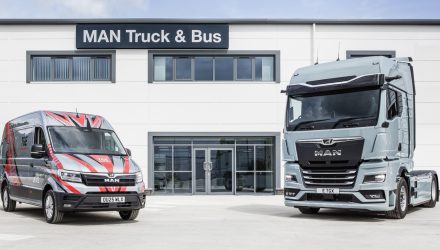Reports indicate that while pure electric vans may be exempt from a forthcoming EV levy, plug-in hybrids (PHEVs) are likely to be included — albeit at a discounted rate.
Last week’s headlines brought the proposed levy into sharp focus, and new detail has emerged via a report in The Times. According to the paper, the tax would apply to EV owners at around 3p per mile, on top of existing motoring duties — a proposal first surfaced in the Daily Telegraph and later confirmed by an industry senior insider.
According to the Times, electric vans will likely be not “in scope” for the scheme, but plug-in hybrid drivers — who already pay fuel duty when using petrol — will be subject to the per-mile charge. The paper adds that government officials have held briefings with major UK vehicle manufacturers to confirm their intent.
It is also expected that the chancellor, Rachel Reeves, will announce a significant support package to accompany the levy in the forthcoming Budget.
How the system is expected to work
Drivers would estimate their annual mileage and pay upfront, rather than being tracked electronically. They would receive credit if they drove fewer miles than estimated, or face a “top-up” if they exceeded the predicted usage. Submissions would then be verified via the vehicle’s odometer at the annual MOT — although in England, Scotland and Wales new cars are only required to have their first MOT after three years, and in Northern Ireland after four.
The proposed EV levy is designed to address the looming shortfall in fuel-duty revenues as drivers switch away from petrol and diesel — and is being positioned as a fairer way for EV motorists to “pay their way”. As a government spokesperson has said: “Fuel duty covers petrol and diesel, but there’s no equivalent for electric vehicles. We want a fairer system for all drivers.”
Why this matters for fleets — especially vans
Michael Shaw, CEO of Aegis Energy, welcomed the exemption of electric vans from the scheme, saying the decision was “vital to help drive fleet confidence in electrification”. “The decarbonisation of the UK’s commercial-transport sector is vital to the country’s economic growth and environmental progress,” he said. “The Government’s focus should remain on policies that enable fleet operators to make this transition, rather than those that risk slowing it down.”
He added: “With commercial transport responsible for around 10% of the UK’s total emissions, the move to zero-emission fleets is both urgent and complex. Any additional tax burden could have discouraged businesses from investing in cleaner vehicles at a time when confidence is critical.”
Shaw also stressed that the rollout of the scheme must be “transparent, fair and efficient” to ensure it supports a mature domestic EV market and avoids unintended consequences for drivers, fleets and manufacturers alike.
For fleet managers, especially in the haulage or light-commercial vehicle sector, the resolution on whether electric vans are exempt is significant. The difference in taxation treatment between pure EVs, PHEVs and conventional ICE vehicles could impact total cost-of-ownership (TCO) calculations, leasing negotiations, residual-value modelling and future procurement decisions. Reference to the recent changes in HM Revenue & Customs (HMRC) advisory mileage rates—for example the new rates of 8p per mile for home-charged EVs and 14p per mile for publicly charged EVs from 1 September 2025 — underscores that tax/treatment regimes are shifting and fleets must stay ahead.
Key points for fleet operators
- Electric vans (BEVs) likely exempt: The reports suggest the new levy will not apply to battery-electric vans — a welcome relief for fleets investing in zero-emission LCVs.
- Plug-in hybrids included: PHEV drivers will be within the scheme, though at a “discounted rate”. Fleets must assess how PHEV TCO will be affected.
- Implementation from April 2028 is expected, following consultation.
- Mileage estimation model: Drivers/fleets estimate annual mileage, pay in advance, then reconcile via MOT odometer reading. Administrative burden may rise.
- Support package promised: The Chancellor is expected to announce measures to “support the market” alongside the levy.
- TCO impact: An extra 3p per mile could add hundreds of pounds per vehicle per year for high-mileage fleets; this needs to be factored into leasing and rental models.
- Strategic reassurance: The exemption of electric vans helps maintain confidence among fleet buyers and the broader electrification trajectory — important given current pressures on EV uptake and the looming zero-emission vehicle (ZEV) mandate.
What to watch next
- Government consultation documents and technical detail of the scheme (vehicles in/out of scope, exact rate, reconciliation process).
- How the support package is structured — for example, whether there will be grants, tax incentives, or infrastructure support aimed at fleets.
- Residual-value impacts on PHEVs and EVs as taxation regimes shift.
- Fleet policy adjustments: Update leasing contracts, mileage estimation practices, charge-point infrastructure deployment, and internal cost modelling.
- Monitoring how the scheme interacts with other tax/tax-benefit changes (e.g., road tax, VED, company-car tax, salary-sacrifice schemes) to understand the full cost-impact.
The proposed pay-per-mile tax for EVs in the UK appears to exempt pure electric vans, while including plug-in hybrids at a discounted charge. For fleet operators, especially those in haulage, LCVs or company-car schemes, this is a significant development that must be incorporated into future procurement strategy and mileage modelling. As HMRC’s changed mileage rates show, tax regimes are in flux — being proactive will help maintain competitiveness and cost-control.






